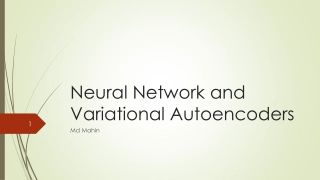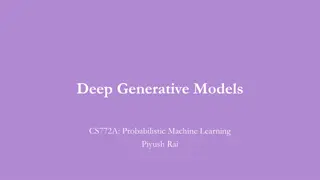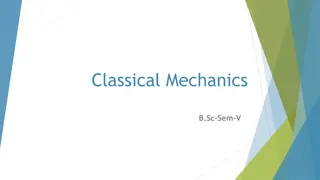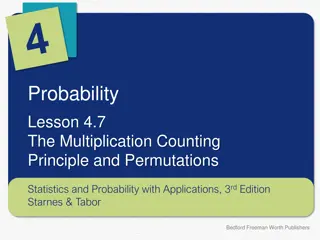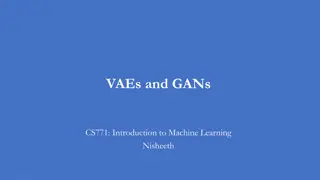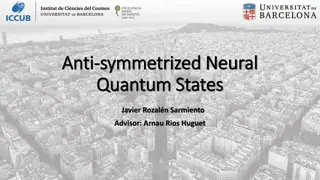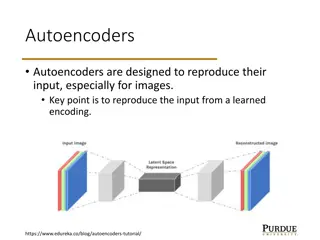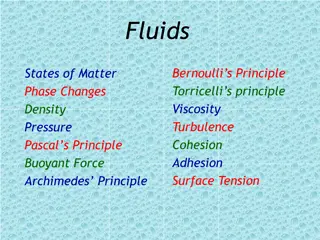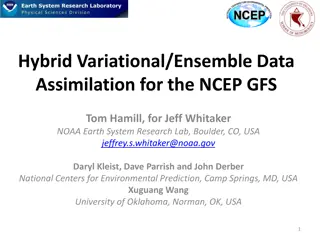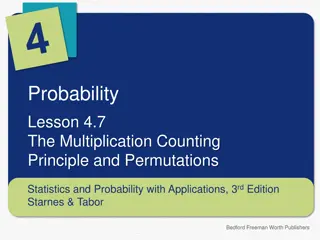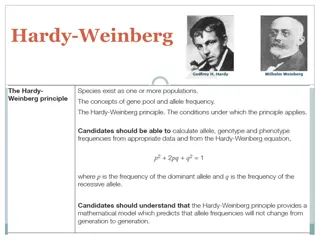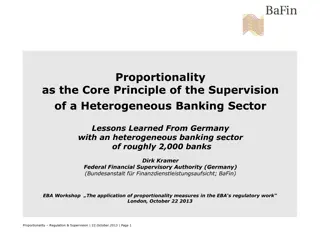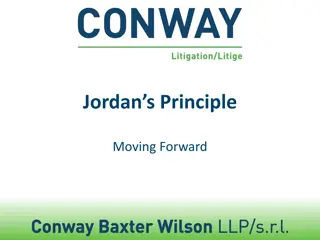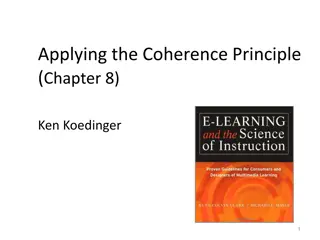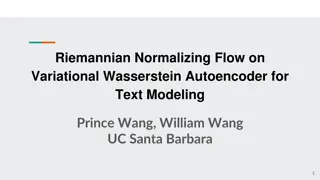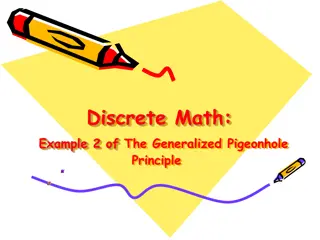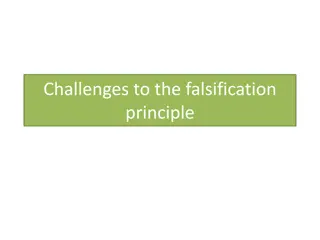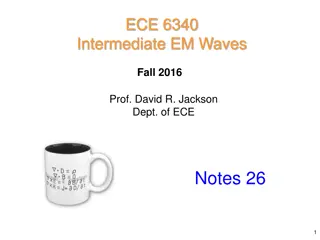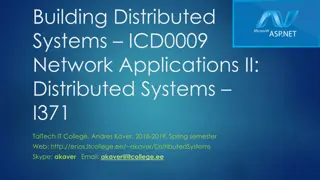Neural Network and Variational Autoencoders
The concepts of neural networks and variational autoencoders. Understand decision-making, knowledge representation, simplification using equations, activation functions, and the limitations of a single perceptron.
4 views • 28 slides
Deep Generative Models in Probabilistic Machine Learning
This content explores various deep generative models such as Variational Autoencoders and Generative Adversarial Networks used in Probabilistic Machine Learning. It discusses the construction of generative models using neural networks and Gaussian processes, with a focus on techniques like VAEs and
10 views • 18 slides
Heisenberg's Uncertainty Principle in Elementary Quantum Mechanics
Heisenberg's Uncertainty Principle, proposed by German scientist Werner Heisenberg in 1927, states the impossibility of simultaneously and accurately determining the position and momentum of microscopic particles like electrons. This principle challenges classical concepts of definite position and m
0 views • 49 slides
Counting Principles and Pigeonhole Principle Explained
Explore the concepts of counting principles and the pigeonhole principle through practical examples and tips. Learn how to apply these principles to solve problems effectively. From understanding basic counting rules to the advanced pigeonhole principle, this content provides insights and guidance o
2 views • 35 slides
Classical Mechanics: Variational Principle and Applications
Classical Mechanics explores the Variational Principle in the calculus of variations, offering a method to determine maximum values of quantities dependent on functions. This principle, rooted in the wave function, aids in finding parameter values such as expectation values independently of the coor
2 views • 16 slides
Le Chatelier's Principle in Chemical Equilibrium
Le Chatelier's Principle states that when a system at equilibrium is disturbed by changes in concentration, temperature, or pressure, the equilibrium shifts to counteract the change. This principle can be applied to predict the direction of equilibrium when changes occur. Changes in concentration, p
0 views • 10 slides
The Multiplication Counting Principle in Probability
The Multiplication Counting Principle and Permutations play a crucial role in determining the number of possible outcomes in various processes. This lesson covers how to use factorials to count permutations, compute arrangements of individuals, and apply the multiplication counting principle to dete
1 views • 14 slides
Variational Autoencoders (VAEs) and Generative Adversarial Networks (GANs) in Machine Learning
Introduction to Generative Models with Latent Variables, including Gaussian Mixture Models and the general principle of generation in data encoding. Exploring the creation of flexible encoders and the basic premise of variational autoencoders. Concepts of VAEs in practice, emphasizing efficient samp
0 views • 19 slides
Jordan's Principle and Its Impact on First Nations and Inuit Children in Canada
Jordan's Principle was named in memory of Jordan River Anderson, a young boy whose tragic story led to the establishment of a legal requirement ensuring access to services for First Nations and Inuit children in Canada without delays or disruptions. This principle aims to prevent situations where ch
1 views • 9 slides
Neural Quantum States and Symmetries in Quantum Mechanics
This article delves into the intricacies of anti-symmetrized neural quantum states and the application of neural networks in solving for the ground-state wave function of atomic nuclei. It discusses the setup using the Rayleigh-Ritz variational principle, neural quantum states (NQSs), variational pa
3 views • 15 slides
Variational Autoencoders (VAE) in Machine Learning
Autoencoders are neural networks designed to reproduce their input, with Variational Autoencoders (VAE) adding a probabilistic aspect to the encoding and decoding process. VAE makes use of encoder and decoder models that work together to learn probabilistic distributions for latent variables, enabli
7 views • 11 slides
Fluids, States of Matter, and Phase Changes
Exploring key concepts in physics including Bernoulli's Principle, viscosity, cohesion, states of matter (solid, liquid, gas, plasma), phase changes (evaporation, condensation, etc.), density, pressure, and more. Discover the properties and behaviors of fluids in relation to gases and liquids, along
3 views • 54 slides
The Acceleration of the Universe and the Equivalence Principle Violation in the Horndeski Vector-Tensor Theory
Exploring the implications of the Equivalence Principle Violation after reheating in the context of the accelerated expansion of the universe. The study delves into the Horndeski vector-tensor theory, gravitational waves, and the impact of modified gravity and dark energy. Insights are provided on t
2 views • 20 slides
Hybrid Variational/Ensemble Data Assimilation for NCEP GFS
Hybrid Variational/Ensemble Data Assimilation combines features from the Ensemble Kalman Filter and Variational assimilation methods to improve the NCEP Global Forecast System. It incorporates ensemble perturbations into the variational cost function, leading to more accurate forecasts. The approach
1 views • 22 slides
The Multiplication Counting Principle in Probability: Exploring Permutations
Exploring the multiplication counting principle in probability, this lesson delves into determining the number of ways to complete a process involving multiple steps. Using factorials for permutations, the content showcases how to compute permutations of individuals taken at a time. Through examples
0 views • 20 slides
Hardy-Weinberg Principle and Genetic Frequencies
Gene pool and allele frequencies play a crucial role in the Hardy-Weinberg Principle, a mathematical model predicting allele frequencies over generations. The principle outlines conditions like a large population, absence of mutations, random mating, and more. Equations such as p² + 2pq + q² = 1 h
0 views • 44 slides
Principle of Majority Rule in Company Law
The principle of majority rule is a fundamental aspect of company law, where the powers of control over a company rest with the general meeting representing the majority shareholders. This principle emphasizes that decisions are made by a simple or special majority vote, except for powers vested in
0 views • 9 slides
Proportionality as Core Principle in Supervising Heterogeneous Banking Sectors: Lessons from Germany
The supervision of a diverse banking sector, such as Germany's with roughly 2,000 banks, is based on the core principle of proportionality. This approach involves tailoring regulations and oversight to fit the individual characteristics of each institution, focusing on qualitative aspects, organizat
1 views • 8 slides
Jordan's Principle: Advocating for First Nations Children's Rights
Jordan's Principle is a vital advocacy tool aimed at ensuring equitable access to necessary services for First Nations children, emphasizing prompt resolution of jurisdictional disputes. Originating from the story of Jordan River Anderson, its implementation has faced challenges and legal battles. C
0 views • 21 slides
The Pigeonhole Principle in Mathematics
The Pigeonhole Principle, demonstrated through examples and explanations by Dr. J. Frost, illustrates the concept that if you have more "pigeons" than "holes," then at least one "hole" must contain multiple "pigeons." This fundamental principle is essential in solving various mathematical problems i
1 views • 27 slides
The Reciprocity Principle in Public Procurement Markets
The concept of reciprocity in access to public procurement markets, particularly in the European Union, has gained prominence in recent years. This principle involves mutual opening obligations for public procurement markets while considering concessions and exceptions, such as excluding defense and
1 views • 4 slides
Writing Lab: Principal vs. Principle
Learn the differences between "principal" and "principle" with this informative Writing Lab mini-lesson. Understand their varied meanings as nouns and adjectives, and how they are used in different contexts. Enhance your diction skills and avoid common usage errors. Enjoy learning about the principa
0 views • 4 slides
Enhancing Student Learning Through Coherence Principle
The Coherence Principle emphasizes the importance of excluding extraneous, entertaining materials to improve student learning. Including such materials can compete for cognitive resources and divert attention from essential information. Utilizing simpler visuals and avoiding websites that violate th
0 views • 7 slides
Riemannian Normalizing Flow on Variational Wasserstein Autoencoder for Text Modeling
This study explores the use of Riemannian Normalizing Flow on Variational Wasserstein Autoencoder (WAE) to address the KL vanishing problem in Variational Autoencoders (VAE) for text modeling. By leveraging Riemannian geometry, the Normalizing Flow approach aims to prevent the collapse of the poster
1 views • 20 slides
Insights into Small Strain Elasto-Plasticity Variational Viewpoint
Explore the variational viewpoint on old and new results in small strain elasto-plasticity, discussing deformation, frame indifference, linear elasticity, crystalline plasticity, stress equilibration, thermodynamics, Von Mises flow rule, existence theory, and variational evolution in a nutshell.
0 views • 13 slides
The Generalized Pigeonhole Principle in Discrete Math
The Generalized Pigeonhole Principle is illustrated through an example involving selecting cards from a deck. By strategically grouping the cards, we determine the minimum number needed to guarantee at least three cards of the same suit are chosen. Additionally, the process is applied to finding the
1 views • 5 slides
Challenges to Falsification Principle
The challenges and discussions surrounding the falsification principle, including criticisms from various philosophers like Antony Flew and R.M. Hare. Explore the critiques, positions, and counterarguments presented in the debates on theological utterances and cognitive meaning. Dive into the examin
0 views • 22 slides
Equivalence Principle in Intermediate EM Waves
Basic idea behind the equivalence principle in the context of intermediate electromagnetic waves is explored. The principle enables the replacement of actual sources with equivalent sources at the boundary of a closed surface, maintaining certain field conditions and boundary constraints. The concep
0 views • 40 slides
Imagining the Future of Jordan's Principle Summit
This content explores Jordan's Principle, a commitment to providing First Nations children with essential services and support. It discusses the legacy of Jordan River Anderson and Canada's efforts to uphold the principle. The work of the Jordan's Principle Action Table is highlighted, along with th
1 views • 18 slides
Building Distributed Systems: ICD0009 Network Applications
This content explores the principles of Object-Oriented Design (OOD) and the SOLID principles. It delves into topics like Single Responsibility Principle, Open-Closed Principle, Liskov Substitution Principle, Interface Segregation Principle, and Dependency Inversion Principle. Additionally, it discu
0 views • 16 slides
Introduction to Pigeonhole Principle
The Pigeonhole Principle explains that if more pigeons are allocated to pigeonholes, then at least one hole must have multiple pigeons. This principle is also extended to the Generalized Pigeonhole Principle, showcasing that in a scenario with n pigeons and h holes, one hole will contain at least n/
0 views • 53 slides
Inclusion-Exclusion Principle
Explore the Inclusion-Exclusion Principle, a fundamental concept in set theory. From understanding disjoint sets to calculating intersections across multiple sets, delve into practical examples and applications. Discover how this principle assists in analyzing overlapping elements and determining se
0 views • 25 slides
The Pigeonhole Principle Explained
The Pigeonhole Principle is a fundamental concept in discrete mathematics that asserts if there are more pigeons than pigeonholes, at least one hole must contain multiple pigeons. This principle is applied in various scenarios to analyze combinatorial problems and establish the existence of repetiti
0 views • 5 slides
Examples Using Work-Energy Principle: Solving Physics Problems
Illustrated examples demonstrate how to apply the work-energy principle in physics problem-solving. Understand the concept of work done, energy transfer, and avoiding kinematics calculations. Learn how to analyze and solve problems efficiently by utilizing the work-energy theorem. Discover practical
0 views • 51 slides
Variational Knowledge Graph Reasoning with Generative Models
In this study, the concept of variational inference is applied to resolve intractable objectives in knowledge graph completion tasks. The research outlines methods, experimental results, and concluding remarks, along with exploring existing knowledge graph completion techniques and problem formulati
0 views • 23 slides
Few-Shot Link Prediction Using Variational Heterogeneous Attention Networks
Explore a novel approach for few-shot link prediction leveraging variational heterogeneous attention networks to enhance representations of high-frequency and few-shot entities. Addressing challenges of long-tailed distributions, tail entity importance variations, and information bottlenecks, the mo
0 views • 10 slides
Religious Responses to the Verification Principle and Eschatological Verification
Explore how believers defend religious language against the Verification Principle, with a focus on responses to challenges and the concept of eschatological verification. Evaluations of the Verification Principle are discussed, highlighting the limitations and strengths in relation to religious tru
0 views • 16 slides
Understanding Computational Chemistry in Quantum Chemistry Studies
Explore the world of computational chemistry in quantum chemistry studies, covering topics like optimizing structures, basis set names, molecular orbitals, Hamiltonian principles, approximations, linear combinations of atomic orbitals, and the variational principle for finding optimal electronic str
0 views • 21 slides
Understanding Superposition Principle in Mechanics of Materials
Explore the Superposition Principle in Mechanics of Materials, a technique to solve complex problems by breaking them into simpler ones. Learn how to apply this principle to analyze beam deflection and loading scenarios with examples provided.
0 views • 7 slides
International Conference on Particle Physics and Astrophysics - Resonant States of Muonic Three-Particle Systems
Explore the study of resonant states in muonic three-particle systems with lithium, helium, and hydrogen nuclei at the 7th International Conference on Particle Physics and Astrophysics. Discover the importance of low-energy interactions in atomic nuclei, computational variational methods, and stocha
0 views • 12 slides
